Arizona Sen. Mark Kelly once said he never aspired to politics, but 'I do get asked a lot'
Editor's note: This story was originally published in 2018. A year later, Mark Kelly announced that he would run for the U.S. Senate in a 2020 special election. He has been one of Arizona's two U.S. senators since his victory in that race and has been mentioned as a possible running mate for Kamala Harris on the Democratic presidential ticket.
TUCSON — Maybe he’ll fly again, so Mark Kelly tries to stay in near-astronaut shape. He turns down TV requests if they interfere with his workouts and searches his schedule for afternoons to play golf. A couple of years ago, he learned how to skydive. And he always finds time for a hike or a workout at Gym 244, a bare-bonesfacility that reminds him of the one NASA used to have, before they ripped it out and replaced it with something new.
Kelly covets routine, and Gym 244 feels familiar. His face is on a Wheaties box by the front door. There’s no central air-conditioning, so the brick walls trap heat and sweat. He likes that. It scares off lesser men.
The Tucson temperature topped 108 degrees when Kelly arrived at the gym on a recent Monday afternoon. It was hotter inside. He walked through an open door and found his trainer of three years, Chris Gartrell, doing planks with 45-pound weights on his back.
“I’m not doing that,” Kelly said.
“By the end,” Gartrell said, popping to his feet, “you might be.”
Kelly could only shake his head. He's 54 years old now, though it's hard to tell. Seven confoundingyears barely show themselves, and other than a balky left knee, he claims to feel no different than when he was a young Navy pilot. But he's deep into middle age, living squarely in the stage when successful men feel the pull to rearrange their lives, to throw it all away and start over.
He's already done that. It wasn't his choice. Life reset itself in January 2011, when a man shot and almost killed Kelly's wife, former U.S. Rep. Gabby Giffords, outside a Safeway near Tucson. Kelly held on to what he could and rebuilt the rest.
Now, as life has settled into a slow burn, he's not sure he wants to do it again.
“I’m very satisfied with where we are,” he said in an interview. But satisfaction isn't the same thing as happiness, so he clarified. "I’m a pretty happy person,” he said. “I’m always of the attitude that if I don’t like my life, I can change it. It’s perfectly in my power to make a big change if I wanted.”
If I wanted. Everything hangs on three words.
People around him seem to sense that a big change could be coming soon. He certainly has the options. But for the first time in a long time — maybe the first time in his entire adult life — Mark Kelly doesn't know what he wants.
He knows the choices.He could go even deeper with Giffords, the political organization he and Gabby built in an attempt to end gun violence. He still plans to fly World View Enterprises' private passenger spacecraft, Voyager, if the company ever finishes the project. He could bolster a lucrative speaking schedule, or write more memoirs and children's books, or pick up the political career his wife never finished.
“I don’t know,” he said. “It’s interesting that I don’t, because I often talk about having a goal and a plan. I advocate for people planning stuff out. But I’m still working on that for me.”
In the meantime, Kelly has found checkpoints wherever they come. Life at NASA ran on step-by-step commands, but successes are more subtle now: Gabby’s speech gets a half-second smoother, a piece of legislation gains a few points in a poll, a senator starts to change his mind. Kelly wants to drop his golf score back into the 70s. He can still bench-press 250 pounds if he pushes himself, and half-seriously asks his trainer if he has a shot at breakingthe Arizona record.
“If I could get to 300, for my age group, what would that be?” Kelly asked midway through his workout. He spoke with the tone of a man who knew he was being unrealistic and didn’t care.
Pros and cons: Mark Kelly could bring pluses, minuses to Democratic presidential ticket: What to know
“That would be it,” Gartrell said.
Kelly considered it. “So,” he said slowly. “For my age group, I could hold the Arizona record.”
Then he smirked. He might have been serious.
He does love a challenge.
Latest Harris campaign news: Sen. Mark Kelly being vetted by campaign as possible running mate: Updates
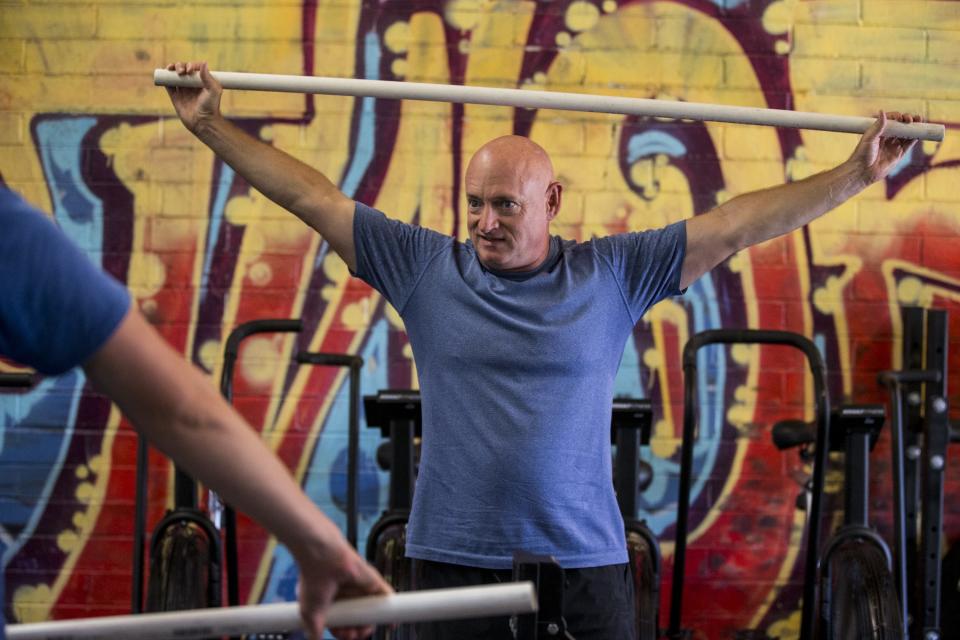
A home in Tucson, for good
He swears he’s never moving again.
After too many homes in too many places, Kelly has spent the past six years in Tucson, in a wide Southwestern-style ranch near the center of the city. It’s within biking distance of their favorite movie theater and Bentley’s, the veggie-heavy breakfast spot where he and Gabby start almost every day. Her childhood home is just a few miles away.
She chose the house on sight. They moved in a year after the shooting and filled the walls with reminders of the lives they once led. The plaque from Gabby’s congressional office leans on a shelf by the front door. Tiny trophies bearing both their names claim every inch of the living room windowsills, right by the graffiti-covered door from Kelly’s quarters on the USS Midway. He’s turned one bedroom into a basic gym and is building a video studio in another, so he can go on TV without leaving the house.
“They’ll have to carry me out of here in a box,” Kelly said. Soon it’ll be the place he’s lived longest in his life.
For now, that's his childhood home in West Orange, New Jersey. In Garden State slang, he and his twin brother, Scott, grew up at "Exit 145 on the Parkway and 15W on the Turnpike," where both of their parents were police officers. The boys took free rein of the neighborhood and became "borderline juvenile delinquents," Mark wrote in a memoir. They slacked in school and found creative ways to injure themselves, though it was only Mark who ever ended up in the hospital: Mark broke his arm. Mark stepped on contaminated glass. Mark refused to use a crosswalk and stepped in front of an oncoming car.
It was also Mark who first realized school might be worth the effort. He stopped staring out of high school windows and started paying attention, working his way into the U.S. Merchant Marine Academy before deciding he just wanted to fly. In the Navy, he flew 39 combat missions over the Persian Gulf before borrowing his brother's suit and interviewing for a spot at NASA. Scott applied, too, and wore the same suit. Both made the cut.
Mark met Gabby in 2003, back when she still went by Gabrielle. They married in 2007 and lived a long-distance marriage. She worked in D.C., a first-term congresswoman, and lived in Arizona; he stayed in Houston's NASA bubble, training his team for the Space Shuttle Endeavour's final flight, scheduled for the spring of 2011. It would be his fourth time in space.
He hadn’t seriously considered what came after he landed. “I thought about a lot of things,” he said. With his resume, he probably could’ve commanded the International Space Station or tried to pilot the first private flight to space. Or maybe he’d return to the Navy and work his way up the Pentagon. That way, he and Gabby could live together.
But before he could decide, a man in a hoodie shattered that future.
“Those options kind of went away,” Kelly said.
Gabrielle Giffords shooting: A fatal chain of events unfolds
After the shooting, Kelly could only react. He brought her to a hospital in Houston, and when she was well enough to leave, moved with her to Tucson. “She deserves to live where she wants to live,” he said, and a good husband wouldn’t leave for a mission across the world, so he stayed. But he adjusted, like he always had, and somehow Tucson became the only place he could see himself.
Now he’s a full-blown Arizonan. He hikes in 108-degree days. He eats prickly pear fruit straight off the cactus, though he thinksthe margaritas are pretty good, too, and holds opinions on certain trails at the Grand Canyon. When the time comes, he knows a guy who can get him a spot near Havasupai Falls. Though he has Pitbull's number in his phone — Kelly calls him Armando — he still still plays music from local band Calexico at home.
But he swears the years haven’t changed him. Maybe he’s a little more patient, and he’s definitely more protective, but Kelly claims to be the same man he was before. He stays level. Friends and family marvel at how nothing seems to rattle him anymore. The tiny frustrations faded away.
“What I notice is that things don’t seem to bother him as much as they used to,” Scott said.
When you've already lived the worst days of your life, everything else seems small.
Rising interest: US Sen. Mark Kelly's name surfaces in Dem poll on day he criticizes JD Vance
A husband, not a caretaker
As Kelly sat at his kitchen table, debating the future and his place in it, Gabby emerged from the back of the house. Behind her trailed Nelson, her yellow Lab service dog. Gabby wore a black leg brace and a blue workout shirt that said, “Elect Women.”
“So when are you going to physical therapy?” Kelly said.
“Right now,” Gabby said.
“Now?”
“Yes,” she said. “Heading out. See you.”
Nelson followed her to the front door. A running car waited outside. Kelly heard the door close, and then the house was quiet.
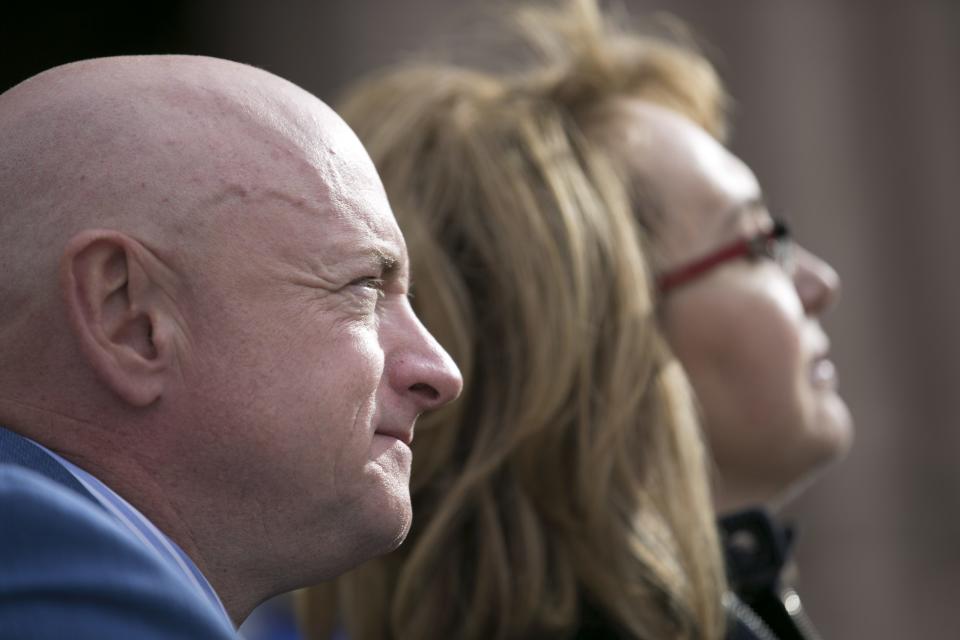
He tries not to think about how things have changed. But something always brings him back. Even now, seven years later, reminders of that day won’t stop coming. People recognize him in airports and swear they were at the Safeway. Others send photos and song recommendations and handwritten letters. They write to say they’re still praying for Gabby, or to beg him to run for the Senate, or to pitch a policy that might stop another mass shooting. Once or twice a year, the FBI sends a new batch of images from the day he can’t forget. By now, he has a small collection in his safe, locked away with everything else he never wants to see again.
Kelly wanted their relationship to stay the same as it always was. Part of him pretends it still is. But part of moving on is accepting that nothing will ever be the same, and making it work anyway.
They were supposed to have a child by now. Gabby was still supposed to do all the talking. He once joked that Gabby used to say at least 70 percent of the words in their marriage. Now she speaks mostly in short bursts. Sometimes, words form in her brain and die on the way to her lips. So Kelly speaks for both of them, sometimes picking up where she trails off. He finishes her sentences and tells the longer version of her stories.
Somebody once told him that there’s a fine line between being a husband and a caretaker. Kelly’s been careful not to cross it. “I am not the person that helps her out,” he said. “That’s why I have other people.” They hired a team of therapists and assistants to handle Gabby’s daily needs, and a small group travels with them around the country.
Gabby remains proudly independent, but Kelly understands when she doesn’t want her picture taken and keeps watch over her in crowded rooms. His eyes bounce back to her, because the threats never stopped coming.
A closer look: FBI releases new photos, video of 2011 Giffords shooting
“We see threats online. All the time,” Kelly said. Somewhere in midtown Tucson lives a man who once threatened to kill Gabby and Supreme Court Justice Samuel Alito. Kelly asked for the man’s address. The authorities won’t give it to him.
Kelly says it’s unrelated, but this summer, he had a set of high-tech security cameras installed around the house. They record every sight and sound, storing 10 days of video in an app on his phone. One feature sounds an alarm if it detects an unfamiliar face. He insists he uses the app only to check when his golf clubs are delivered to the front door.
“It’s pretty slick,” Kelly said a few minutes after Gabby left for physical therapy. To prove it, he pulled out his iPhone and tapped open the app. He clicked on a camera feed facing the driveway, rewound the footage and watched his wife ride away.
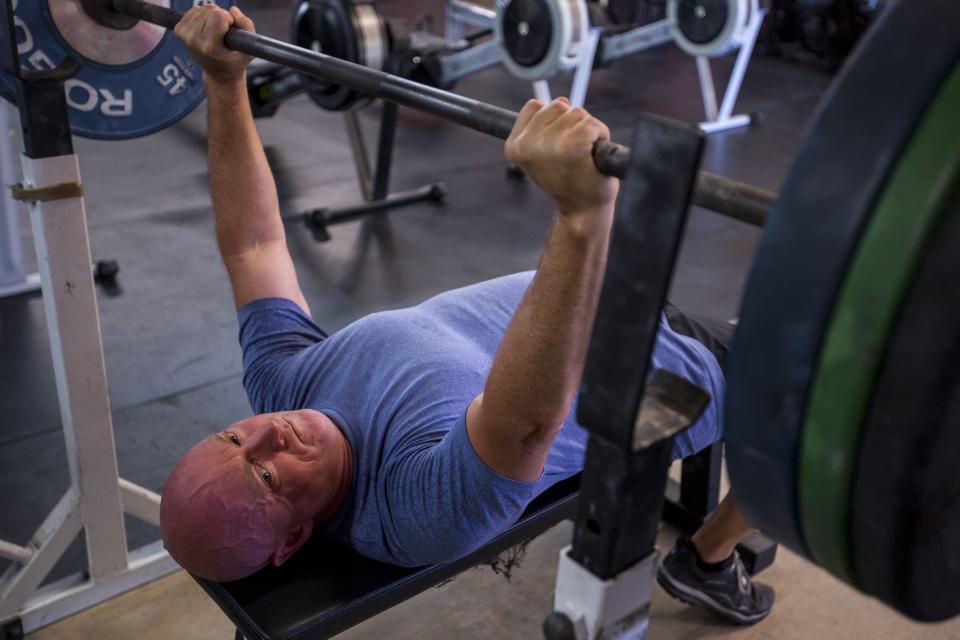
A turning point, then another
It didn’t have to be them. Kelly knew that.
They could’ve done anything. In the years after the shooting, they became known as “The Congresswoman and the Astronaut,” held among the nation’s most admired couples. They were still settling into Tucson, seeing how much of their lives they could salvage.
Kelly went to space one final time, and when he returned, he discovered that he had become the face ofan epidemic. TV bookers called after each new massacre, and he sat in uncomfortable chairs and said what he thought he was supposed to: Now isn’t the time to talk about politics. The community needs to heal. There will be a time and a place.
“And then one day,” Kelly said, “I got tired of saying that.”
That day was Dec. 14, 2012. Kelly was in China, traveling to speak. Gabby was at home in Tucson. Both of them stared at CNN. In Newtown, Connecticut, a small town just 90 miles from where Kelly grew up, 20 schoolchildren were dead.
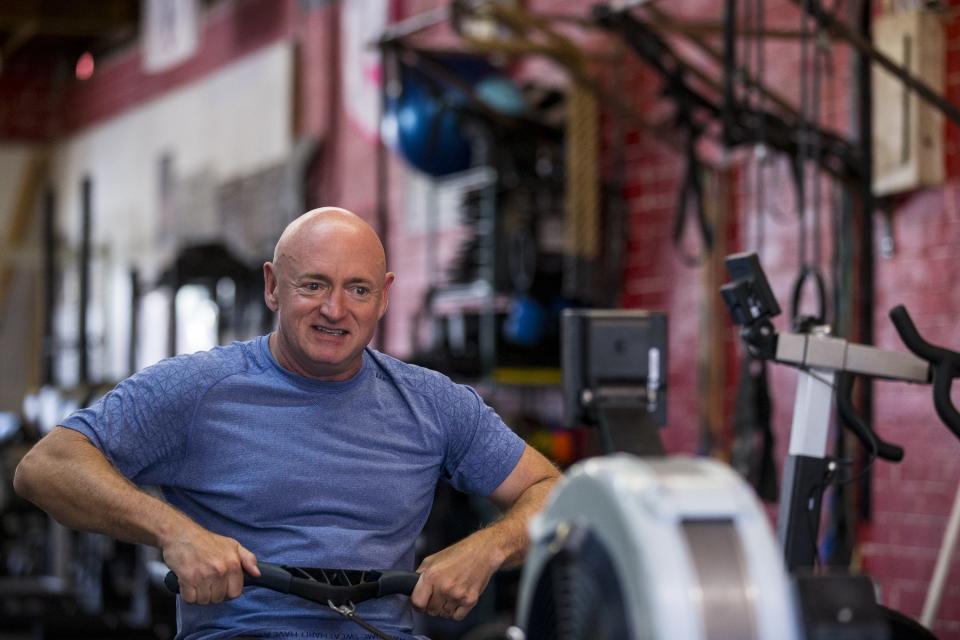
“We must help,” Gabby said over the phone.
Kelly asked what she meant.
“Do something,” she said. “Not just talk.”
Kelly had never talked publicly about politics before. A life in the military drummed it out of him. He wasn’t sure he even knew how.
But he couldn’t envision himself 10 years older, looking back at another decade of mass murder and everyday gun violence, wondering how much death he could’ve prevented.
“We decided to go all-in,” he said, “and figure out if we could do this.”
They named the new organization Americans for Responsible Solutions because that’s exactly what they had become. They were two more Americans swept into a movement, looking for space between the gun debate’s two extremes. Kelly helped hone the platform, which included expanding background checks on all gun purchases, closing what’s often called the “gun-show loophole” and keeping guns away from people with histories of violence or mental illness.
A Harris-Kelly team? Here's what happened when they hit the campaign trail together
They’re moderate proposals. Kelly considers himself a moderate man. Almost by instinct, he reminds people that he does, in fact, respect the Second Amendment. He owns at least seven guns — “a hunting rifle and a bunch of handguns” — and doesn’t see a contradiction. He hasn’t screamed at Congress or used his sway to fill the streets with protests. He’s not even the face of his own organization. Gabby appears in the TV ads. But Kelly is the steady, unrelenting voice.
“He doesn’t fly planes every day anymore, but the attitude hasn't changed,” said Pia Carusone, Gabby’s former congressional chief of staff who is now an outside consultant for the organization. “He’s very mission-driven and team-oriented. You kind of don’t get a better team member than an astronaut.”
Kelly eventually compares everything to his time with NASA. As commander, he managed a small team of astronauts and worked within a sprawling bureaucracy. Every day pointed toward the same goal. There were checkpoints and to-do lists. The mission offered a clear dividing line between success and failure.
“It’s a very well-defined criteria of success,” Kelly said.
Kelly’s political progress has been more difficult to define.
Now named Giffords, the organization has become one of the nation’s most influential voices against gun violence and the National Rifle Association. In the 2018 election cycle, the Giffords PAC has raised more than $15 million and endorsed more than 300 candidates. It responds to every mass shooting and almost every gun-related bill, and has helped push gun safety toward the top of a national issue list.
"There are clearly people walking around today, including kids, that would've been shot and killed if we weren't out there doing this," Kelly said. "I am 100 percent convinced of that."
But he knows influence alone doesn't save lives. New laws might.
Giffords' state-level power has faltered on the Hill. “Everything in Congress has been frustrating,” Carusone said. The organization failed in its first big push, supporting a 2013 bill that would have expanded background checks on gun purchases, and has earned only minor victories since. Giffords is most effective when stopping “bad stuff,” as Kelly calls bills that expand gun rights, because the organization doesn’t have enough money or power to loosen the NRA’s grip on lawmakers.
Push for change: Intern, surgeon who helped save Gabby Giffords lead gun law push in Arizona Legislature
So Giffords has focused on finding new ones. It spends heavily on state and local races, using its head couple’s still-considerable star power to push candidates over the top. More than 75 percent of candidates Giffords has endorsed won their race.
“I think they’ve been really effective in picking candidates who share their values,” Sen. Kirsten Gillibrand (D-N.Y.), one of Capitol Hill’s most outspoken gun-control lawmakers and a longtime friend of Gabby’s, said in an interview. “They targeted picking rotten apples. And it works.”
'Ghost guns': Giffords group asks web hosts to shut down 'ghost gun' sites
Now, just days from the midterm elections, Kelly senses an opening. The NRA warned members this year that it was in “deep financial trouble.” Democrats across the country have placed gun safety near the top of their campaign platforms. The student-led March for Our Lives movement, born out of a mass shooting in Parkland, Florida, is pushing to register young voters by November. Giffords is supporting that effort.
So Kelly keeps traveling. Last year — technically his seventh year of retirement — he flew over 400,000 miles. This year, he's already hit at least 15 states. There will be more. The woman who makes his calendar planned for him to be on the road 75 percent of the rest of the year, giving speeches and stumping for candidates he’d never met. Kelly told her to make it 70 percent.
He wanted more time at home. If only a couple extra days.
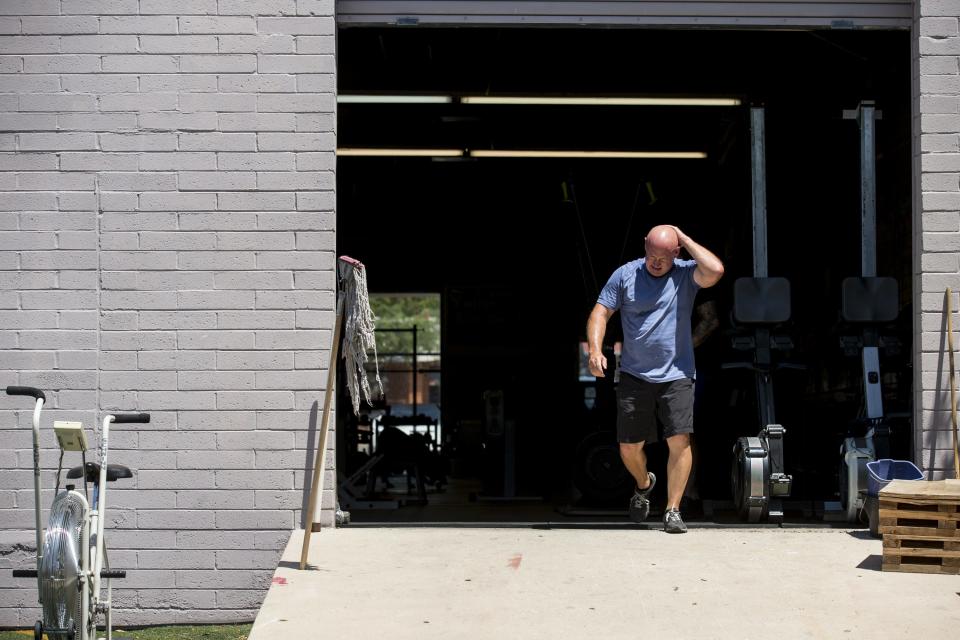
'Really? That's all of you'
He was in Tucson barely a week before work pulled him away again.
The remains of an August thunderstorm hung in the air as Mark and Gabby flew into Albuquerque. At the airport, they piled into a black Suburban and headed straight for the University of New Mexico’s downtown campus, where nine young activists had gathered to share stories of gun violence and talk about a way to stop it.
The Suburban rolled to a stop by a back entrance. Aides and assistants came spilling out of the doors. Then Kelly stepped out, carrying a suit jacket in one hand and a list of talking points in the other.
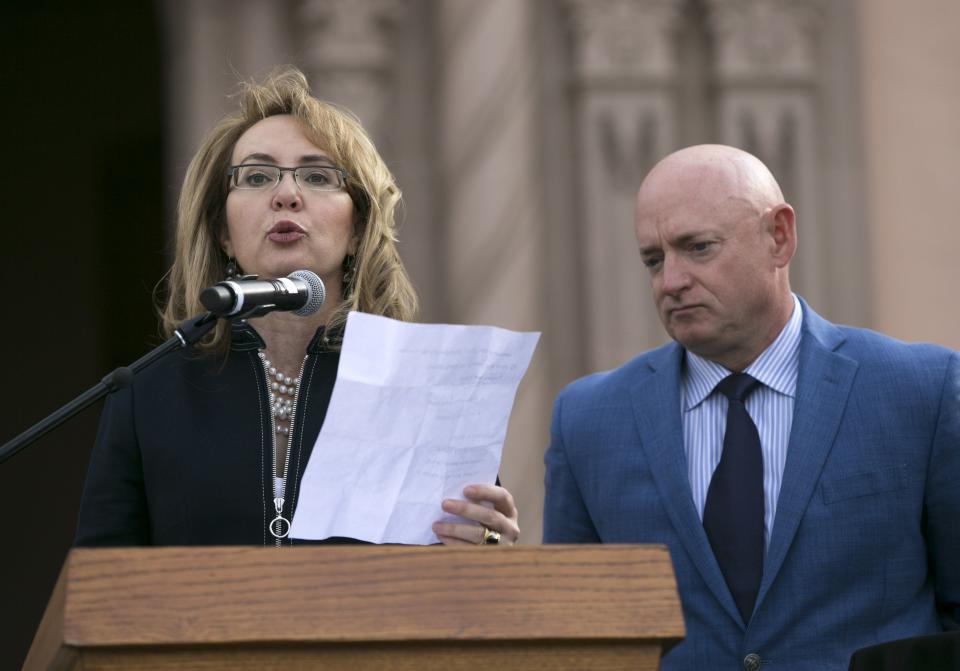
“Ready, Gabby?” Kelly asked, and they headed inside. Two more Giffords staffers greeted them at the door, bringing the day’s total to five. One reminded Kelly that they supported all of New Mexico’s proposed gun bills. Upstairs, the mayor of Albuquerque thanked them for their endorsement, insisting it pushed him over the top. Then another assistant pointed them into an anatomy classroom, where the students waited by the door.
“I hope you’re ready to talk about stuff,” Kelly said when they walked in. He shook every student’s hand, and the group posed for a photo before taking their seats around a tight square of tables. Kelly pulled out his wife’s chair and dropped into his own.
The mayor’s wife, Kistin Keller, introducedthe guests, starting with the same painful story that had come to define their lives. “Remember, that on January 8, 2011 …” she said. Kelly stared at the table.
When she had finished, Kelly pointed around the room and tried to memorize every student’s name. Most came from colleges and high schools across New Mexico. Two belonged to local tribes. One, a timid girl seated right next to him, was 8 years old.
“Let me ask you something,” Kelly said, trying to start a conversation. “How many people in here know somebody who’s been shot? That doesn’t count Gabby.”
Every hand rose.
Kelly scanned the room. He glanced at Gabby, then back at the students, making sure he had seen correctly. Nine hands hung in the air.
“Really?” he said. His voice fell, as if he couldn't believe it.“That’s all of you.”
'January 8, 2011, changed my life forever, and the lives of so many others'
He’d asked the same question around the world, to groups of students in Australia and the United Kingdom. Almost nobody there ever raises their hand. In the United States, he usually sees about half the group.
It had never been every student in the room.
“It’s interesting how we got here as a country,” he said. He unwound the history that now included his name, lecturing about the 150,000 American kids shot since Columbine and the series of decisions that led to the country’s gun epidemic. He pulled gun-violence statistics from memory and urged the students to never underestimate the power of their vote, even though only one of them was old enough to cast a ballot.
Hepulled a folded page from his pocket and handed it to Gabby. She smoothed it onto the table, then gave a 30-second speech from memory. “These are scary times,” she said, her voice rising. “We must do something.”
The meeting ended a few minutes later. “Let us know what you need,” Kelly told a group of boys. Then the room emptied. Gabby grabbed her husband’s arm, and they walked toward the elevator.
Kelly stopped short, lost in thought. He looked back at the empty room.
“Hey, how about it,” he said, “that every one of those kids —“
Gabby cut him off.
“Guns,” she said, shaking her head. “Awful.”
Tucson memorial dedication on the 7th anniversary of the mass shooting
A chime sounded, the elevator doors opened and the Giffords traveling party crammed inside. Kelly stood at the front, going over their schedule. Gabby stayed in the back, her head in the corner.
The doors opened again. The Suburban sat outside, waiting to take them to yet another hotel room. Walking quickly, Kelly pushed open one of the glass double doors and stepped into fading sunlight. Assistants slid into the back seat, and a driver in a black suit held open the passenger door.
Before he reached the car, Kelly realized his wife wasn't with him. He turned around, and there was Gabby, still inside the building, trapped behind the double doors. She pressed her good arm against the door. It didn't move.
“Gabby, you’re stuck,” Kelly said. He doubled back, headed to help his wife, but an assistant beat him there.
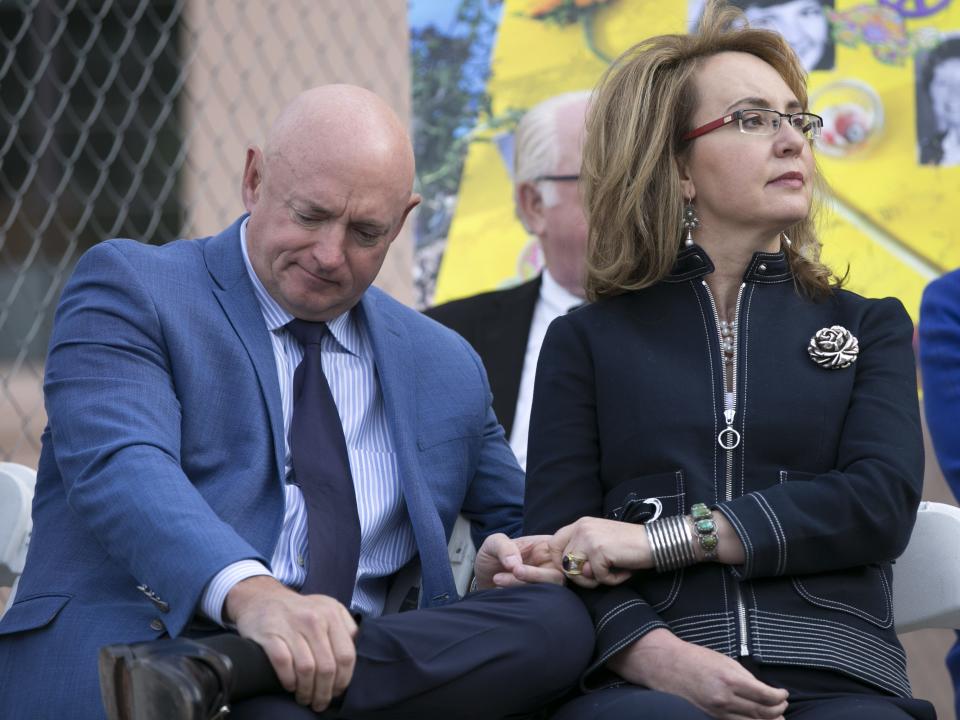
The question that won't go away
This was supposed to be her future. Gabby was the one with superstar potential, the rare politician who could straddle the line between partisanship and practicality. Friends looked at her and saw a future governor.
Kelly just wanted to fly.
“It was never something I had previously aspired to,” he said of a political career. “But I do get asked a lot.”
Calls for a Kelly campaign have grown constant. The Washington Post called him “Arizona Democrats’ dream candidate.” More than 3,000 people signed an online petition urging him to run in 2018. It didn’t work. Pundits argue that his military service might endear him to the state’s deep-red desert voters. The gun-safety crusade could lure in liberals. His brother thinks he could win. Democratic Party leaders think he could win. Friends think he could win.
“I’d vote for him,” said Nelson Miller, a former Navy SEAL and longtime friend of the couple's. Miller described himself as sitting “on the other side of the political spectrum” from Kelly — he watches Fox News and voted for Donald Trump — but would support him for any office. “There’s a lot of us that are wondering what his political ambitions are,” Miller said. Sometimes he teases Kelly, asking when he's going to run for president. Kelly never responds.
Kelly seems tired of the question. How many times can he give the same answer? When asked, he responds deliberately, slowly, careful not to tease at something that isn’t there.
“It’s not something I have planned,” he said. “But it’s not something I have totally eliminated as a possibility in my future. Under the right circumstances, at the right time, I might seriously consider something. That’s not today.”
He’s not sure what the right circumstances may be.
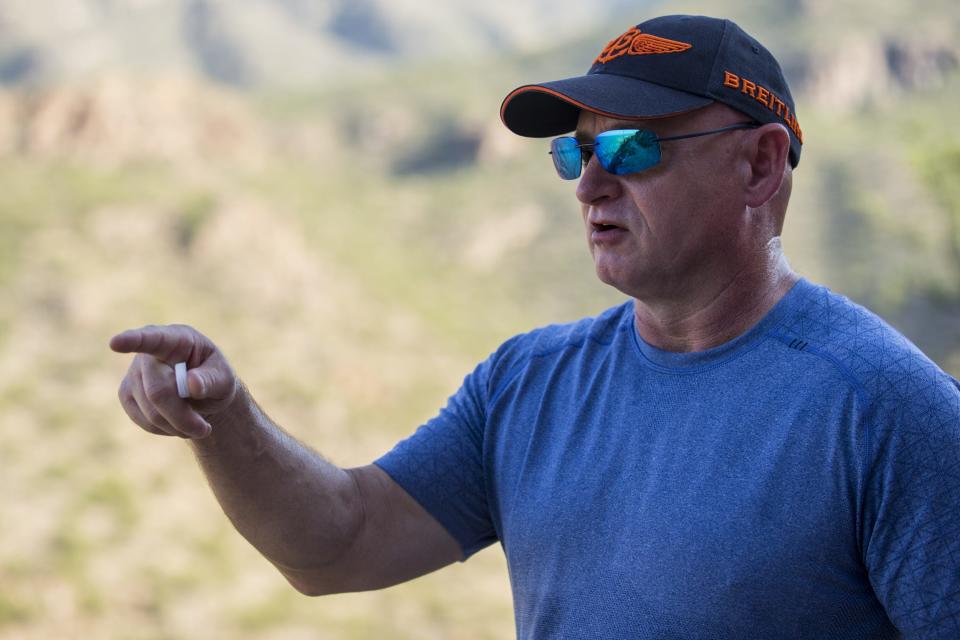
Where to next?
On their second day in Albuquerque, Kelly wore the same suit and hoped nobody would notice.
Gabby did. He missed a button on his white shirt, and she reached over to work it through the hole. They locked eyes. Kelly smiled and handed her a copy of the same speech she gave the day before. A staffer gave Kelly a speech of his own, and the entire Giffords group headed into the campaign offices of U.S. Rep. Michelle Lujan Grisham, a Democratic candidate for governor who had earned the Giffords endorsement.
“Happy, happy, happy,” Gabby said to the sky. She and Kelly walked through a crowd and into a cramped back room. A wide campaign banner covered one wall. A plate of breakfast muffins sat untouched. In the corner, a young woman stared at her feet.
Her name was Miranda Lovato. She was a young college graduate, an Albuquerque native who still fought panic attacks after a country-music festival in Las Vegas erupted into the largest mass shooting in modern American history. Lujan Grisham asked her to speak at the rally, furthering the Giffords’ gun-safety theme. Lovato pulled on a dark-green dress and kept to herself, until she looked up and saw Gabby Giffords walk into the room. Gabby reached for a hug. They both tried not to cry.
Supporters cycled through the room. Gabby and Lujan Grisham swapped tales of congressional gridlock and posed for photos. Kelly looked at the muffins and decided against having one. A low murmur built in the main room. Kelly stepped into the hallway and examined the crowd, the line of cameras, the short wooden stage. Lovato straightened her dress and fidgeted with her notes.
“Have you done this a lot?” Kelly asked.
“No,” she said. “First time.”
“Here’s some advice,” Kelly began, even though she hadn’t asked. “When you walk out there, tell yourself, ‘These people need to hear exactly what I have to say. It’s important.’”
“OK,” Lovato said. She scanned her speech one last time. Then she heard her name and the call of 200 strangers. She took a single breath and walked quickly toward the stage, leaving Mark and Gabby alone.
Kelly opened a warm bottle of water and drained it. His notes reminded him of the talking points: “America needs leadership,” one bullet point read. “We need you to vote in November,” urged another. Gabby dropped into a cushioned chair and mouthed each word of her speech. The only sound was Lovato’s opening lines.
“Ready?” Kelly said after she finished.
Gabby nodded.
“OK, we’ve got a plan,” he said. He turned toward the stage and walked into a wall of cheers. Somebody handed him a microphone. “Hello, everybody,” he began. He gestured toward Lovato and thanked her for speaking. “I know that’s not easy,” he said, and she smiled.
The speech crinkled in Kelly’s back pocket. He didn’t need it. From memory, he told the room about the round table and the students who all raised their hands, then recited the same gun-violence statistics that could never capture the pain he knew firsthand. But he tried to be quick. “I know you didn’t want to hear from me at all,” he said bashfully, “so let me introduce to you the person you did want to hear from.”
Gabby emerged from the hallway and reached out a hand. Kelly pulled her onto the stage and flipped through his notes as she started into the same speech she gave the day before. Exactly one minute later, Gabby handed back the microphone, and cheers swept them off the stage.
Assistants guided Gabby outside. Kelly hung back. Cameras tracked him from all directions. Reporters had questions. Assistants offered praise. Strangers wanted photos, hugs, autographs. Kelly stood for one TV interview, then another. He signed a little boy’s notebook, encouraging him to “Reach 4 the stars!”
Soon it was time to leave. Gabby was already waiting in the car, ready to head to their next event in Santa Fe. They were about to be late. Kelly waved goodbye and walked into a bright New Mexican morning. Then he stopped. He turned to an assistant and asked a single question.
“Where am I going next?”
Opinions: Kamala Harris doesn't scare Republicans, but Mark Kelly absolutely should
This article originally appeared on Arizona Republic: Mark Kelly: Former astronaut's life after wife Giffords' shooting
